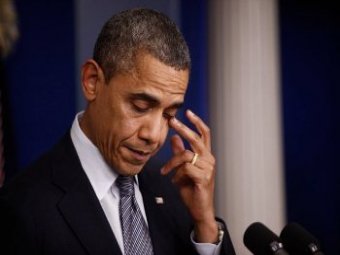Foreign Policy: arming opposition is Obama’s worst foreign policy

President Obama’s move to increase the public flow of arms to selected Syrian opposition is probably his worst foreign policy decision since taking office. It is basically the Afghan surge decision redux: long months of grueling internal deliberation about whether to escalate military commitments resulting in an “Option C” policy choice which pleases nobody and which few think will work. At least the Afghan surge came with an expiration date.
Nobody in the administration seems to have any illusions that arming the opposition are likely to work. The argument over arming the opposition has been raging for well over a year, driven by the horrific levels of death and devastation, fears of regional destabilization, the inadequacy of existing policies, concerns about credibility over the ill-conceived chemical weapons red line, and a relentless campaign for intervention led by hawkish media, think tanks, Congress, and some European and regional allies. Through all of this, Obama (who has not forgotten the lesson of Iraq has by all accounts opposed deeper intervention, and rightly so, along with much of the Pentagon and many others across the administration. The most direct cause of the switch likely was Hezbollah’s open entry in the fighting and fears that the fall of Qusair could lead to a rapid opposition collapse.
Obama’s move is likely meant as a way to “do something”, and perhaps to give Secretary John Kerry something to work with diplomatically on the way to Geneva II, while deflecting pressure for more aggressive steps. The logic behind the steps has been thoroughly aired by now. The dominant idea is that these arms will help to pressure Syria to the bargaining table, strengthen the “moderate” groups within the opposition while marginalizing the jihadists in the rebellion’s ranks, and assert stronger U.S. leadership over the international and regional proxy war. Much of it sounds like magical thinking. History does not suggest that this will work as planned
On its own, the decision will have only a marginal impact on the Syrian war — the real risks lie in what steps might follow when it fails. The significant moves to arm the opposition began last year, with or without open American participation. The U.S. is modifying its public role in a proxy war in progress, providing more and different forms of support to certain opposition groups, rather than entering into something completely new.
The real problem with Obama’s announcement is that it shatters one of the primary psychological and political footholds in the grim effort to prevent the slide down the slippery slope to war. He may have chosen the arming option in order to block pressure for other, more direct moves, like a no-fly zone or an air campaign. But instead, as the immediatw push for robust intervention” makes obvious, the decision will only embolden the relentless campaign for more and deeper U.S. involvement in the war. The Syrian opposition’s spokesmen and advocates barely paused to say thank you before immediately beginning to push for more and heavier weapons, no-fly zones, air campaigns, and so on. The arming of the opposition may buy a few months, but when it fails to produce either victory or a breakthrough at the negotiating table the pressure to do more will build. Capitulating to the pressure this time will make it that much harder to resist in a few months when the push builds to escalate.
I don’t think anyone in the administration really has any great confidence that arming the opposition will end Syria’s civil war or work in any other meaningful way, though many likely feel that it’s worth trying something different after so many months of horrors and want to believe that this will work. Obviously, I am deeply skeptical. I hope I’m wrong, and that against the odds the new policy can make a difference, and help to resolve the Syrian catastrophe. But more likely it just drags the U.S. further down the road to another disastrous war — one which has just become harder to prevent.







